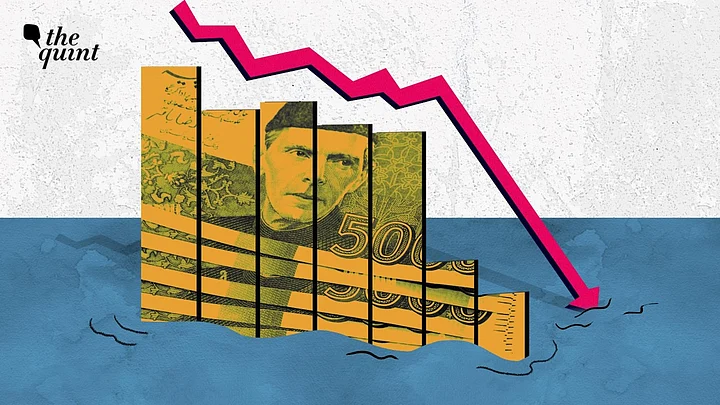Pakistan is facing a multi-dimensional crisis, probably the worst since 1971 when it broke up after the Bangladesh war. The crisis is overwhelming for Pakistan’s Army establishment and political players – and there is almost a universal sense of lack of direction.
Last week, Pakistan’s Prime Minister Shehbaz Sharif and Army Chief Syed Asim Munir visited Saudi Arabia and the UAE, pleading for more aid to prevent the looming default, as the country's foreign exchange reserves plunged to a nine-year low to just $4.3 billion, a level not enough to pay even one month of imports.
Mounting Food Crisis & Depleting Cash Plague Pakistan
Pakistan depends heavily on imports. There are early signs of social unrest due to the worsening wheat crisis, which reportedly has led to citizens fighting over bags of flour, and at least one person getting trampled to death.
Economic commentators generally describe Pakistan’s troubles in terms of its chronic twin deficits: recurring current account deficits and fiscal deficits. Pakistan’s number one issue is the intellectual bankruptcy and short-sightedness of its military, political, business, and land-owing elites.
William Easterly described Pakistan’s political economy as a 'paradox of growth' without development in a 2001 World Bank case study. However, even the growth has faltered during the last 25 years as indicated by a yawning gap in GDP per capita growth compared to many developing countries, notably India and Bangladesh (see chart).
What Led to the Drastic Downfall?
Twenty five years ago, Pakistan’s GDP per capita was 46% higher than India’s – and now it is 20% less. What went wrong? There is little recognition in Pakistan that as globalisation swept across the world after the fall of the Berlin Wall, countries like India, China, and Bangladesh seized the opportunities offered by trade liberalisation and progressed, but Pakistan’s ruling elites continued to view the world through a Cold War mindset and thought foreign aid would continue to enable Pakistan to extract geo-strategic rents.
One example of such misguided policies is Afghanistan. It is nothing short of a strategic disaster that after spending nearly two decades of supporting the Taliban and celebrating their return to power in August 2021 as an instance of “breaking the chains of slavery”, Pakistan finds itself diplomatically isolated with little leverage even with Afghanistan.
Pakistan’s military spending is among the top ten globally in terms of percentage of the GDP. Its tax to GDP ratio of around 9% is among the lowest in the world. It has to borrow more every year because there is no money left in the budget to spend on development after servicing debts and military spending.
According to a United Nations Development Program (UNDP) report, the military establishment owns the largest conglomerate of business entities in Pakistan besides being the country’s biggest urban real estate developer and manager with wide-ranging involvement in the construction of public projects.
Some political activists call Pakistan “plotistan” alluding to the fact that buying and selling plots of land is the most lucrative business in Pakistan due to an extremely favorable tax regime.
Pakistan Military’s Exploits & a Glaring Economic Divide
Malik Riaz is one of the richest persons in Pakistan and owns Bahria Town, the largest privately-held real estate development company in the country. Riaz started as a clerk in the Military Engineering Service and became a multi-millionaire real estate developer with the full backing of the military. Last year, the local media was rocked by audio tapes that allegedly pointed to Riaz’s close links with Imran Khan and Asif Ali Zardari.
Riaz also has had close ties with Nawaz Sharif’s family. More than £190m of assets, including a £50m mansion overlooking Hyde Park in London, were seized from him after a settlement in a UK police “dirty money” investigation. Riaz had bought this mansion from Nawaz Sharif’s son Hasan Nawaz for £42.5 million in 2016.
Malik Riaz is a microcosm of Pakistan’s real political economy where all the state institutions and major political actors act in concert to protect their class and corporate interests. It is, therefore, not surprising that all of Punjab (Pakistan’s largest province), home to a population of more than 120 million, collects less in urban property taxes than the city of Chennai in India, with a population of 10 million people.
Growth Without Development: Can Pakistan’s Poor Survive Such Paradox?
How do people manage? Pakistan’s poorest 20% struggle to survive. According to the UNDP report, the “poorest 20% of Pakistanis fall in the low human development category, with a Human Development Index (HDI) value of just 0.419. This is below Ethiopia’s HDI value and comparable to that of the Republic of Chad which ranks 186th of 189 countries in the global HDI ranking.”
Large numbers of lower-income and middle-class Pakistanis are able to make ends meet due to the generosity of their relatives abroad. In 2021, remittances from overseas Pakistanis accounted for 12.6% of the GDP, compared to 6.5% of Bangladesh and just 3% in India. It is not surprising, therefore, that 90% of Pakistan’s economy is driven by consumption with chronically low savings and investment levels.
Can Pakistan continue to live off foreign aid and workers’ remittance without reforming the economy? Pakistan’s elites were never under so much pressure to answer this question as they are now.
(The author is a political economy expert and ex-Equity Investments Head. This is an opinion piece and the views expressed above are the author’s own. The Quint neither endorses nor is responsible for the same.)
